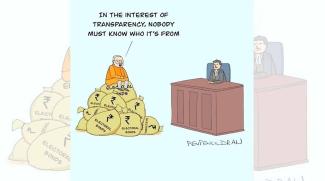EB (Electoral Bonds) and ED (Enforcement Directorate) have emerged as the two biggest sources of power for the Modi government. In the ongoing elections to Rajasthan and Chhattisgarh, the ED has actually become the star campaigner for the BJP. The ED has been in existence for a long time, but what the Modi government has done is to weaponise it to target its opponents. The electoral bonds have been invented and introduced by the Modi government to facilitate unbridled and anonymous corporate funding for the BJP. This has led to unprecedented use of money power in elections and gives the BJP a massive advantage over all its opponents. The two weapons, ED and EB, are however used in contrasting ways: every ED raid is executed as a spectacle while the EB is shrouded in secrecy.
The excessive use of the ED in the Modi era has made ED a household name. It has perhaps now even overtaken the CBI in the infamous list of weaponised central agencies. Legally mandated to monitor the enforcement of laws related to financial crime like the PMLA or the Prevention of Money-Laundering Act, 2002; FEMA or the Foreign Exchange Management Act, 1999; and FEOA or the Fugitive Economic Offenders Act, 2018, ED is now mostly in the news for raiding the residences and offices of non-BJP leaders. The ED now has extraordinary powers to arrest under non-bailable sections and attach properties of the accused, and statements secured by it from the accused are treated as admissible evidence!
Despite such extraordinary powers and excessive use, the rate of actual progress in ED cases is however very low. Since 2005 the ED has registered nearly 6,000 cases, but charges have been filed in less than 20 percent of cases and only 25 cases have been concluded. The ED has been used in an absolutely selective and one-sided manner. Cases against several former opposition leaders have been dropped after they joined the BJP or crossed over to the NDA camp. From Himanta Biswa Sarma in Assam and Suvendu Adhikari in West Bengal to BS Yediurappa in Karnataka and Narayan Rane, Bhavana Gawali, Yashwant and Yamini Jadhav to most recently Ajit Pawar and Chhagan Bhujbal in Maharashtra, the list of the BJP's ED-regulated political acquisitions is quite long and diverse.
No less long and diverse is the list of Opposition leaders being targeted and harassed by the ED. Several leaders are languishing in jail, quite a few others are being targeted now as the campaign of vendetta intensifies in the run-up to the crucial 2024 elections. Vindictive raids are going on in Rajasthan and Chhattisgarh even as election dates have been announced and the poll code of conduct is in place. While the Sangh-BJP propaganda machinery uses the ED raids to malign the opposition and boost the Modi regime's anti-corruption claims, the anti-corruption bureau of the Rajasthan government has caught two ED officials red-handed taking bribes. In Chhattisgarh, the ED is busy waging a malicious campaign against the incumbent Congress CM by publicising whatever unverified information it has got from approvers even before carrying out any investigation. Chhattisgarh CM Bhupesh Baghel has rightly demanded that vehicles used by central agencies like ED and CRPF should be searched thoroughly to rule out possibilities of misuse.
If ED is being used as a lethal frontline election weapon by the Modi regime, Electoral Bonds are the invisible means for accumulation of money power. The bonds have been introduced by amending an entire series of acts, from the Companies Act to the Representation of People Act, to guarantee absolute anonymity to the corporate donors. There is no restriction on who can donate (foreign powers and shell companies are now free to influence Indian elections) and how much (there is no limit to the amount a company can donate) - electoral bonds have become the easiest and surest way to render black money white with guaranteed secrecy and impunity. In the Supreme Court hearing over the petition challenging the constitutional validity of the EB scheme, the government even said that the electorate had no right to know the source and nature of a party's poll funding.
The Electoral Bond system is the most brazen example of the business-politics nexus and corporate power grab in India. The Reserve Bank of India and the Election Commission had both raised major objections to the scheme, expressing serious apprehension about its impact and implications. Yet, the Modi government overrode all objections and imposed this shadiest of schemes on India's electoral system. Centralisation of power in the hands of the Modi government, record concentration of wealth and profit-making opportunities in a few chosen corporate hands and in reciprocation, complete centralisation of political funds for the BJP through an absolutely opaque process - India's electoral democracy has been reeling under this three-pronged attack. The fascist project of the Sangh brigade is being executed on the basis of this brazen mockery of parliamentary democracy and manipulation of the electoral system. Some political observers have termed it electoral autocracy. The ED-EB combine works as the fulcrum of this system. The SC hearing has exposed the real purpose and nature of electoral bonds, it now remains to be seen if the SC will still let the bonds survive as a sacrosanct executive policy! Perhaps only an emphatic defeat of the Modi regime in the coming elections will overturn the EB-ED raj. Let the ongoing Assembly elections in five states pave the way in this direction.











